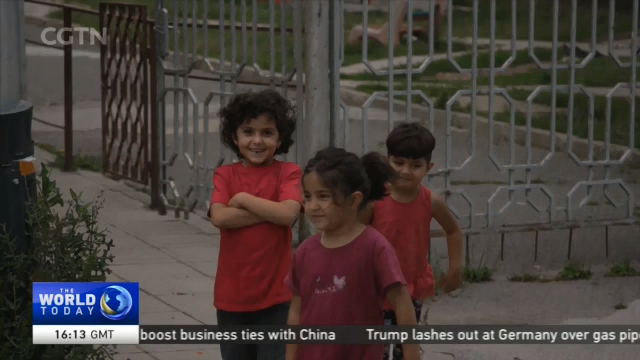
08:30, 12-Jul-2018
EU Migrant Crisis: Bulgaria influenced by migrants and EU policy
Updated
07:54, 15-Jul-2018
03:31

The number of migrants entering Europe has dropped sharply since 2015. But migration remains a serious challenge for many European countries – and the issue is politically explosive. Bulgaria, as a country on the edge of the EU, stands to be impacted greatly by shifting policies. CGTN's Aljosa Milenkovic is in the country and sends this report.
269 kilometers of border connects Bulgaria and Turkey. 201 kilometers of fence divides them. Its modern motion sensors, cameras, and watch towers are aimed at preventing illegal crossings. Almost 100,000 migrants crossed from Turkey into Bulgaria before the fence was built.
ALJOSA MILENKOVIC SHTIT, BULGARIA "We drove for more than 300 kilometers South-East from the capital Sofia, to the village of Shtit. Behind me is Turkey, and until recently this was one of the most popular crossing points for migrants heading to the EU. But, since this high-security fence was constructed, things here have changed dramatically."
It took almost half an hour for us to traverse some 500 meters from the border to the village through the two meter high bushes with thorns. What we saw when we entered the village is that Shtit is on the verge of dying out. Its younger population left for pursue better lives in other towns, while the elderly stayed put. Even the storks abandoned their nests. In the village center, close to the border police station, I met 68-year-old Kosta. He's lived here his entire life.
KOSTA SHTIT VILLAGER "People are calm now. Before, when migrants were coming from everywhere, there was fear. Now after they constructed the fence, people are much more relaxed. There isn't so many of them running here. Sometimes, someone crosses, they are caught and delivered to where it is needed. So, there is no fear anymore like there was before, among the people here."
Estimates say that around half of those who illegally crossed the border evaded being caught. Those who are, get taken to migrants centers, like this one at the outskirts of Sofia. They are offered processing as asylum seekers, and to stay and be integrated into Bulgarian society. But most of them refuse.
MARIANA STOYANOVA BULGARIAN RED CROSS "Bulgaria cannot compete with countries like Germany, Sweden, Denmark, France even or UK, where the social benefits for asylum seekers and refugees are much higher and longer."
ALJOSA MILENKOVIC SHTIT, BULGARIA "So, this means that these people are actually trying to leave Bulgaria?"
MARIANA STOYANOVA BULGARIAN RED CROSS "Exactly. The majority, the vast majority is perceiving Bulgaria as a transit country. They try to transit, even not to be, how to say, identified when crossing the country."
Now some of the Western EU countries these people want to reach, led by Germany, want to return them to the countries where they first entered the EU. That could send tens of thousands of migrants back to Bulgaria.
MILKO BERNER BULGARIAN DEPUTY MINISTER OF INTERNAL AFFAIRS "The question at the moment is discussed very intensively in Europe. Until now, there is no solution on how to deal with this problem. I can't tell now what we could expect. Time is certainly needed for the consolidation of a position from EU nations regarding this. Those are hard and most likely going to be very long negotiations."
But regardless of how hard those talks will be, as the deputy minister says, Bulgaria is NOT ready to accept those migrants back. Aljosa Milenkovic, CGTN, village of Shtit, Bulgaria.

SITEMAP
Copyright © 2018 CGTN. Beijing ICP prepared NO.16065310-3
Copyright © 2018 CGTN. Beijing ICP prepared NO.16065310-3